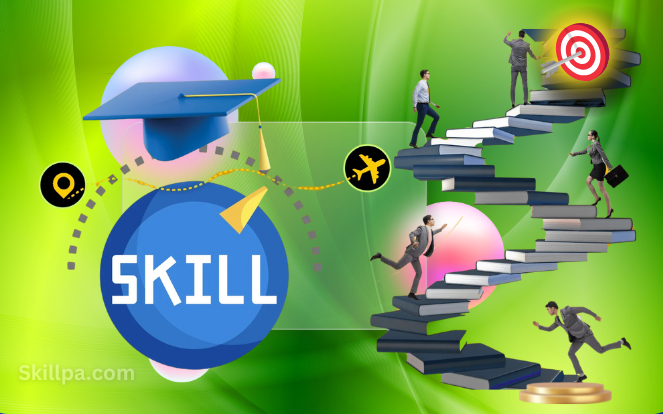
Which skill courses should be done along with education?
Which skill courses should be done along with education?
In today’s fast-paced world, education alone often isn’t enough to secure a fulfilling job. While degrees and diplomas lay the foundation, skill courses can elevate your profile significantly. With industries evolving at lightning speed, understanding which skills are in demand can set you apart from the competition.
Imagine walking into an interview armed not just with academic knowledge but also practical skills that employers crave. The right mix of education and specialized training can open doors you never thought possible. Let’s explore why developing these additional competencies is essential and how they can enhance your career trajectory!
Importance of Skill Development
Skill development is vital in a world where change is constant. As technology advances, the demand for adaptable professionals grows. Relying solely on traditional education may leave you unprepared for new challenges.
Acquiring skills tailored to specific industries enhances your employability. Employers increasingly seek candidates who can demonstrate practical abilities alongside academic credentials. This combination signals readiness and resilience.
Moreover, skill courses foster personal growth. They encourage critical thinking, problem-solving, and creativity—traits that are invaluable in any field. Engaging with hands-on learning experiences not only boosts confidence but also opens up new avenues of exploration.
In addition to career benefits, developing skills allows for lifelong learning. It keeps your mind sharp and engaged while providing opportunities to pivot into different sectors as interests evolve or market needs shift. Embracing skill development ensures you remain relevant and competitive throughout your professional journey.
Benefits of Combining Education and Skill Courses
Combining education with skill courses creates a robust learning experience. Traditional education provides foundational knowledge, while skill courses offer practical application of that knowledge. This blend enhances your employability.
Skill courses often teach industry-specific tools and techniques that are highly valued in today’s job market. When you add these skills to your resume, employers notice the extra effort you've made to be well-rounded.
Additionally, this combination fosters adaptability. With rapid changes in various industries, having both academic qualifications and practical skills means you're better equipped to adjust to new roles or challenges.
Learning through skill courses also helps build confidence. Mastering a specific skill can empower individuals and encourage them to take on more complex tasks at work or start their own ventures.
Networking opportunities arise as well when attending diverse classes, connecting you with peers who share similar interests or career goals.
Top 5 In-Demand Skills for the Job Market
The job market is constantly evolving, and certain skills are becoming essential for success. Here are the top five in-demand skills you should consider enhancing through a skill course.
First up is digital marketing. With businesses shifting online, expertise in SEO, social media, and content strategy can set you apart.
Next is data analysis. Companies rely on data-driven decisions now more than ever. Understanding analytics tools can make you a valuable asset.
Coding remains crucial. Proficiency in programming languages opens doors across various industries, from tech to finance.
Soft skills like communication can't be overlooked either. Employers seek individuals who can effectively collaborate and convey ideas clearly.
Project management continues to be vital as organizations strive for efficiency and productivity. Familiarity with methodologies like Agile or Scrum adds significant value to your resume.
How to Choose the Right Skill Course?
Choosing the right skill course can feel overwhelming, but a few guiding principles can simplify your decision. First, assess your interests and career aspirations. Think about what excites you and where you envision yourself in the future.
Next, research various courses available online or at local institutions. Look for those that align with industry demands and trends. A business course focusing on digital marketing or data analysis can be valuable today.
Consider the format of learning that suits you best—whether online flexibility works better than traditional classroom settings. Check reviews or alumni testimonials to gain insights into course quality.
Evaluate the certification opportunities associated with each course. Credentials from reputable organizations often carry more weight in job applications, boosting your marketability significantly.
Balancing Education and Skill Development
Balancing education and skill development can feel like a juggling act. With the demands of coursework, it’s easy to overlook the importance of practical skills.
Setting clear priorities is essential. Create a schedule that allocates time for both academic responsibilities and skill courses. This way, you ensure neither aspect gets neglected.
Engage in hands-on projects relevant to your field. Working on real-world tasks enhances learning and retention while also building a portfolio that showcases your abilities.
Networking plays a huge role as well. Attend workshops or local meetups where you can connect with professionals who value both education and practical experience.
Remember, it’s not just about completing assignments; it's about developing competencies that will set you apart in the job market. Embrace opportunities for growth through collaboration and exploration beyond traditional classroom settings.
Success Stories of Individuals who Combined Education and Skill Courses
Many individuals have transformed their lives by combining education with skill courses. Take Sarah, for instance. While pursuing her degree in marketing, she enrolled in a digital marketing course. This combination allowed her to land an internship where she applied what she learned immediately.
Then there’s John, who studied computer science while taking coding boot camps on the side. His hands-on skills made him stand out among his peers during job interviews, leading to a lucrative position at a tech startup right after graduation.
Another inspiring example is Priya, who balanced her studies in business administration with graphic design classes. Today, she runs her own successful freelance agency and credits both educational backgrounds for her achievements.
These stories illustrate how merging academic knowledge with practical skills not only enhances employability but also fosters personal growth and confidence.
Conclusion
Skill development is a crucial aspect of personal and professional growth. As educational institutions focus on theoretical knowledge, the need for practical skills becomes increasingly apparent. The right skill courses can enhance your capabilities and make you a more attractive candidate in the job market.
Combining education with skill courses offers numerous advantages. It allows individuals to apply what they learn in real-world scenarios, making their education more relevant and engaging. Many employers now seek candidates who not only have academic qualifications but also possess hands-on experience through specialized skill training.
With an ever-evolving job landscape, certain skills are particularly sought after. Digital marketing, data analytics, project management, coding, and soft skills like communication are among the top five in-demand competencies today. These areas not only open doors to various career opportunities but also equip individuals with tools for lifelong learning.
Choosing the right skill course requires careful consideration of your interests and career goals. Start by assessing which skills align with your desired profession or industry trends. Online platforms offer flexible options that cater to different learning styles and schedules.
Balancing formal education with skill development can seem challenging at first glance. However, effective time management strategies can help you integrate both seamlessly into your routine without feeling overwhelmed.
There are countless success stories from those who've embraced this dual approach—individuals who transformed their careers by complementing their diplomas with practical knowledge gained from business courses or specialized workshops stand testament to its effectiveness.
The journey of combining education and relevant skill courses could very well be one of the most rewarding paths towards achieving professional aspirations while preparing for future challenges ahead.









